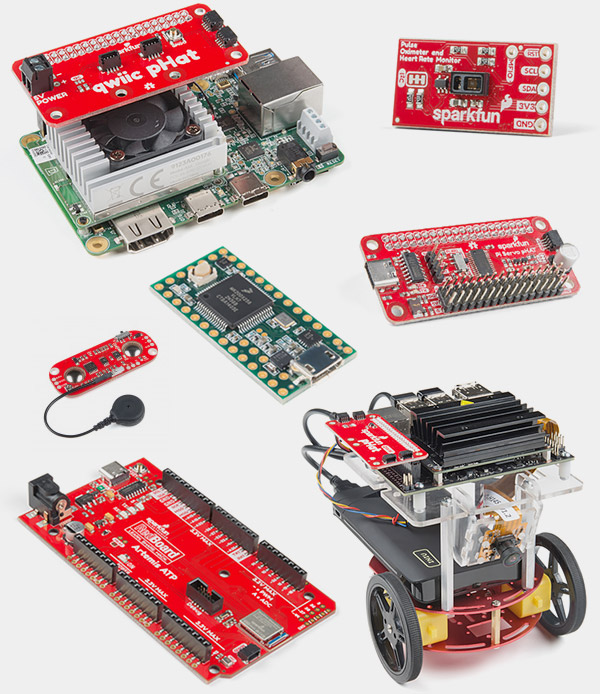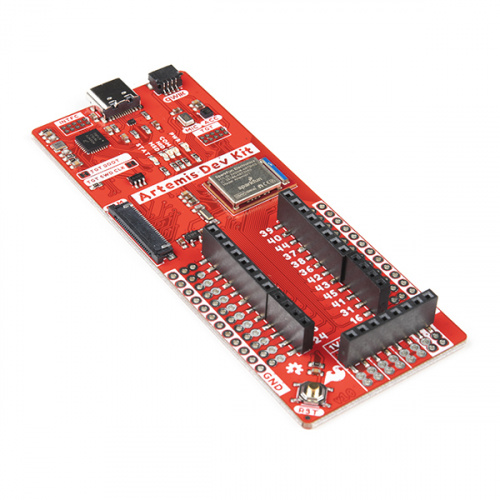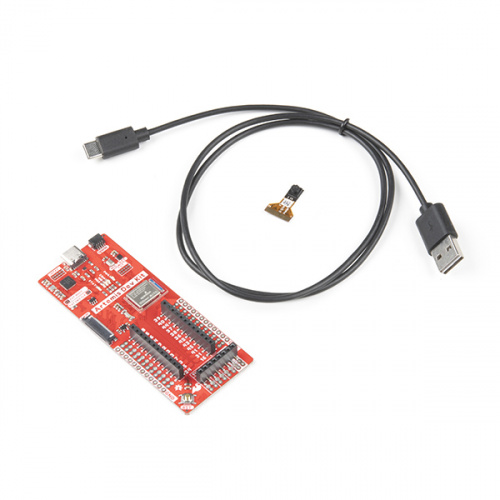Today we have a very special announcement, and an update to all of our existing and future Artemis products. Starting today, full Arduino IDE, Bluetooth 5.0, and Arm Mbed OS software support is provided with all Artemis boards! That includes our two newest development platforms that utilize the open-source, FCC-certified Artemis module.
The SparkFun Artemis Development Kit (or Artemis DK) is the latest board to be released with the SparkFun Artemis Module, and it allows access to more software development features than previous Artemis-based boards. Recommended software to program the Artemis DK include the Arduino IDE, Arm® Mbed™ OS and AmbiqSDK. An updated USB interface (MKL26Z128VFM4 Arm® Cortex-M0+ MCU, from NXP) allows the Artemis Dev Kit to act as:
- Mass Storage Device (MSD): provides drag-and-drop programming to the Artemis Module
- Human Interface Device (HID): for the debugging interface to the Artemis Module
- Communication Port (COM): provides a serial communication UART between the Artemis and the USB connection (PC)
We also offer the Artemis Development Kit in... well, a kit! Inside you will find a USB-C cable to hook your board up to a computer and a Himax HM01B0 Camera to get started with the platform's machine learning capabilities as easily as possible.
Attached to the Qwiic I2C bus on the Artemis DK, we've added a LIS2DH12TR MEMS accelerometer (for things like gesture recogntion), a digital MEMS microphone, an edge camera connector for the Himax CMOS imaging camera (to experiment with always-on voice commands), and image recognition with TensorFlow and machine learning.
All of the Artemis Development Kit's pins are broken out to 0.1" spaced female headers (i.e. connectors). There are also two rows of breakout pins with 0.1" pitch spacing for headers, and a 0.08" pitch spacing to clip on IC-hooks - used by most logic analyzers.
Additionally the silk on the back of the Artemis DK acts as a chart to show pins by functionality (peripherals, ADC, PWM, UART0 and UART1), and acts as an aid while developing software. The board is powered and programmed via USB-C, includes a Qwiic connector to make I2C easy, and is fully compatible with SparkFun's Arduino core to be programmed under the Arduino IDE.
We've also written a full guide on how to start developing with the two newest additions to the SparkFun Artemis product line. This guide will cover the general design of the development board and the installation of the recommended software used to program the Artemis DK. In addition, we have provided basic examples to verify the operation of the board. For more advanced functionalities, we have software development guides for each of the recommended platforms that users can reference.
Every existing and future Artemis board, module and peripheral will feature full Arduino, BLE and Mbed OS software support. We understand that it has been a long time coming for these, but we're confident in their ability to meet all of your upcoming project needs and final board designs. Our Artemis Dev Kit Hookup Guide will get you started developing with these features, but expect fully detailed guides for the Arduino IDE and Arm Mbed in the next few weeks. We'll let you know when those are released!
Be sure not to miss this: The SparkFun developers that worked on these new boards and feature support will be joining Arm's "Innovation Coffee" livestream to walk through the SparkFun Artemis Development Kit (DK) and the SparkFun OpenLog Artemis. Set your reminders for tomorrow (Thursday), September 8th, at 11 a.m. MT (5 p.m. UTC)!
That's it for now. We will dive into a little more detail into these new Artemis boards in our Friday Product Post, so check back for the video!



No comments:
Post a Comment